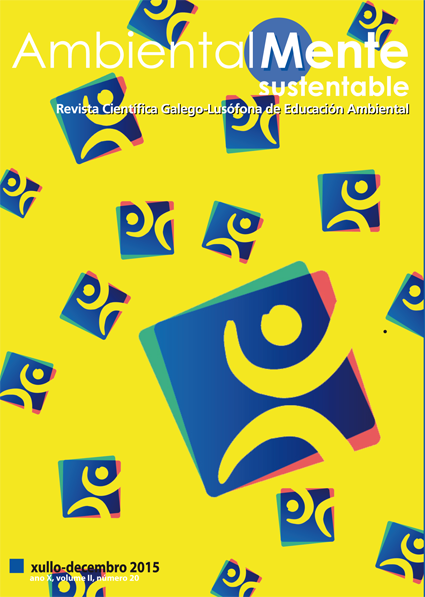A Educação ambiental na Galiza: controvérsias sobre o desenvolvimento do campo e seu estado atual
DOI:
https://doi.org/10.17979/ams.2015.02.020.1591Palavras-chave:
educação ambiental, história de vida, políticas sociais, profissões ambientaisResumo
Num contexto socioeconómico e político como o actual, que exige uma transformação para outros modelos de sociedade, a educação ambiental na Galiza, que pode ser um poderoso instrumento de mudança, está a sofrer um retrocesso preocupante face às conquistas de décadas anteriores (SGEA , 2011). Este artigo procura lançar alguma luz sobre esta realidade, apresentando algumas das principais conclusões da investigação "A educação ambiental na Galiza: análise sociobiográfica da sua construção como campo", tese de doutoramento realizada no âmbito do Grupo de Investigação SEPA da USC, com cobrar às ajudas do Plano Galego 2011/2015 (Call 2011). O texto inclui aqueles pontos interpretativos que contribuem para a linha de reflexão proposta no III Congresso Internacional de Educação Ambiental dos Países e Comunidades de Língua Portuguesa, em torno do paradoxo da perda de peso da educação ambiental nas políticas ambientais e educacionais com o agravamento da problemas que constituem a crise ambiental. Por trás dos discursos deterministas oficiais, que argumentam e justificam o desmonte do campo com base em políticas de austeridade "necessárias" e "inevitáveis", escondem-se dinâmicas e lutas de poder que vêm condicionando sua trajetória e que é interessante explicitar.
Downloads
Referências
BOURDIEU, Pierre (1979). La distinción. Criterios y bases sociales del gusto. Madrid: Tearus.
BOURDIEU, Pierre (2003). Os usos sociais da ciência. Por uma sociologia clínica do campo científico. Sao Paulo: Fundaçao Editora da UNESP.
CARVALHO, Isabel Cristina M. (2002). El sujeto ecológico y la acción ambiental en la esfera pública: una política en transición y las transiciones en la política, Tópicos en Educación Ambiental, 4, 10, 37-49
CARVALHO, Isabel Cristina M.; ROSELAINE, Carmen e VILLELA, Marcos (2011), A missão “ecocivilizatória” e as novas moralidades ecológicas: a educação ambiental entre a norma e a antinormatividade,Ambiente&Sociedade, 14, 2, 35-49
HOBSBAWN, Eric (1995). A era dos extremos: o breve século XX: 1914-1991. São Paulo: Companhia das Letras
MEIRA, Pablo (2009). Outra lectura da historia da Educación Ambiental e algún apuntamento sobre a crise do presente, AmbientalMente Sustentable, ano IV, nº8, pp.16-43.
PARDELLAS, Miguel e MEIRA, Pablo (2012). Educación ambiental en Galicia: crisis, ¿qué crisis?, Boletín Carpeta Informativa del CENAM [http://www.magrama.gob.es/es/ceneam/articulos-de-opinion/2012-02-pardellas-meira_tcm7-253463.pdf]
RAUBER, Isabel (2002). Movimientos sociales y representación política. Buenos Aires: CTA
RODRÍGUEZ LÓPEZ, Emmanuel (2015). Por qué fracasó la democracia en España. La transición y el Régimen del 78. Madrid: Traficantes de Sueños
SATO, Michèle e DOS SANTOS, José Eduardo (2003). Tendências nas pesquisas em educação ambiental, NOAL, F.; BARCELOS, V. (Orgs.) Educação ambiental e cidadania: cenários brasileiros. Santa Cruz do Sul: EDUNISC, p. 253-283.
Downloads
Publicado
Edição
Secção
Licença
Os traballos publicados nesta revista están baixo unha licenza Creative Commons Recoñecemento-CompartirIgual 4.0 Internacional.
Permitese e anímase aos autores a difundir os artigos aceptados para a súa publicación nos sitios web persoais ou institucionais, antes e despois da súa publicación, sempre que se indique claramente que o traballo pertence a esta revista e se proporcionen os datos bibliográficos completos xunto co acceso ao documento.



